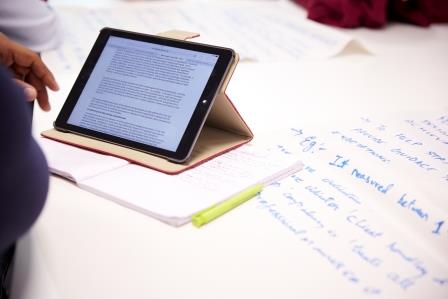I was recently at the European COST network meeting in Cyprus on ‘The digital literacy and multimodal literacy practices of young children’. The event was attended by delegates from over thirty countries and the network promises to provide a valuable and much-needed forum for synthesising and sharing research related to young children’s digital lives. The network is in its first year but various events, projects and publications are in the pipeline which will be of great value to practitioners and policy-makers across Europe. More details here [http://digilitey.eu/].
What struck me however was how far behind we are in England in terms of curriculum in this area. In many European countries schools are required to include digital media within their language arts or literacy curriculum, as indeed are schools in states within Canada, Australia, the US and other countries within the UK. Yet in England, despite a reference to digital literacy in the Computing programmes of study, digital literacies and multimodality are not addressed explicitly within the curriculum for English. Schools are of course free to interpret the curriculum as they wish and many are integrating digital media within their provision in important and creative ways, but there is no requirement to do this and given that statutory assessments do not engage with the production or use of digital media, in many schools addressing these 21st century literacies will not be a priority.
Of course we do have a re-worked Computing curriculum and many schools are experimenting with ways of introducing coding with young children and using this to generate opportunities for creativity. This move would seem to be a positive one and there are plenty of examples of innovative and valuable work in this area- see for example the Computing At School network [http://www.computingatschool.org.uk/]. However, this move foregrounds mathematical and scientific dimensions of computer use.
More than ever, we are negotiating our lives online and engaging with diverse forms of digital media for multiple purposes (social, economic, political, civic, leisure-related and so on). This does not just involve making safe or judicious decisions about sources or resources, but exploring aesthetic, rhetorical and communicative dimensions of using digital media, aspects which would seem best addressed through the subject of English. There is a need to ensure that English provision recognises the wide range of media that children use and encounter, and the kinds of practices in which they do and could engage in their current and future lives. This is a point I take up in a review for the Cambridge Primary Review Trust [http://cprtrust.org.uk/] which will be published later this year.
Addressing digital media with young children requires a literacy pedagogy that is flexible enough to respond to the changing nature of literacy and cultivates children’s ability to experiment, take risks and collaborate in the production and re-working of texts. It needs to support children to consider critically the digital practices in which they engage, e.g. how do (or could) they represent themselves through the texts they make, and how are they represented through others’ texts. These are principles that Guy Merchant and I explore through an article for the Journal of Adolescent and Adult Literacy, ‘The challenge of 21st century literacies’ [http://onlinelibrary.wiley.com/doi/10.1002/jaal.482/abstract ]. At Sheffield Institute of Education we are working to develop such pedagogies through collaborating with teachers in what we call ’21st century literacy maker circles’. This approach involves children working across schools in a shared digital space through a project created jointly by their teachers in a cross-school planning group (a Maker Circle). The work is in its early stages but appears to be generating motivating and productive contexts for teachers and children to experiment with 21st century literacies.
Cathy Burnett is a Professor of Literacy and Education in Sheffield Institute of Education
If you would like to know more about this work, please contact me at c.burnett@shu.ac.uk or Professor Guy Merchant at g.h.merchant@shu.ac.uk.

Leave a Reply